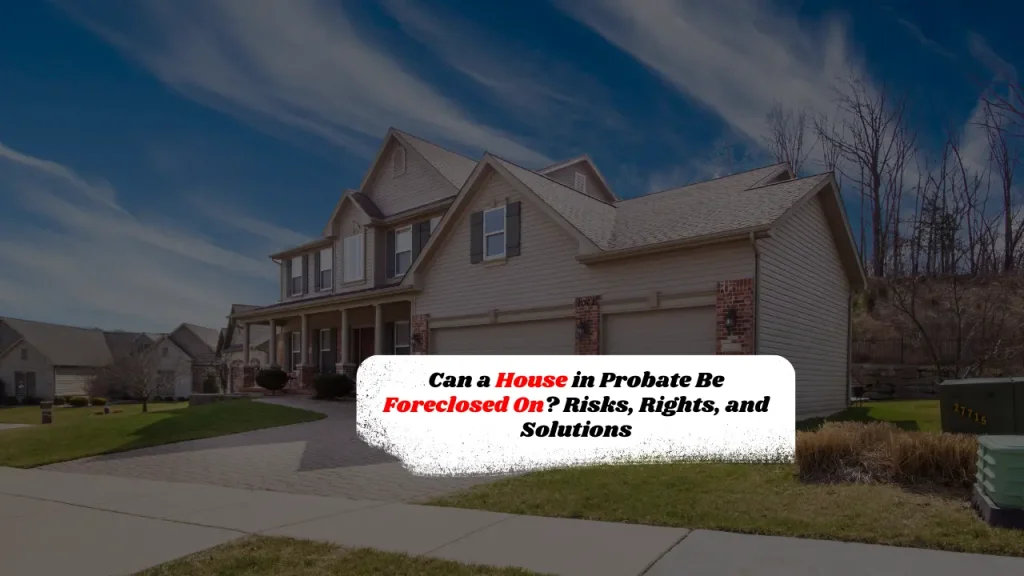Can a House in Probate Be Foreclosed On? Risks, Rights, and Solutions
Yes, a house in probate can be foreclosed on if mortgage payments lapse. However, lenders must follow state probate laws, and executors have tools to delay or prevent foreclosure. Here’s what heirs and executors need to know.
Imagine inheriting a home only to discover the bank is threatening foreclosure—while it’s still stuck in probate. Can lenders seize a property before the estate is settled? The answer is complex, urgent, and depends on one critical question: Who’s responsible for the mortgage when the homeowner dies?
Table of Contents
Understanding Probate and Foreclosure: The Legal Collision
When a homeowner dies, their property enters probate—a court-supervised process to settle debts and distribute assets. Meanwhile, the mortgage lender still expects payments. If payments stop, foreclosure becomes a risk. Key factors:
- The mortgage’s status (e.g., current vs. delinquent at death).
- State probate laws governing creditor claims.
- Executor’s actions to protect the property.
Statistic: 1 in 5 U.S. foreclosures involves inherited property (Consumer Financial Protection Bureau).
Can a Lender Foreclose During Probate? Breaking Down the Process
1. Lender’s Rights vs. Probate Protections
- Lender’s Right: Mortgages are secured debts, meaning the home is collateral. If payments stop, lenders can initiate foreclosure—even during probate.
- Probate Protections: Most states require lenders to file a claim against the estate first. Executors then have 30–90 days to respond (varies by state).
2. The Role of the Executor
The executor is responsible for:
- Notifying the lender of the borrower’s death.
- Using estate funds to keep the mortgage current.
- Selling the property to pay off the loan (if heirs can’t afford it).
Example: In California, executors have 4 months to notify creditors before foreclosure can proceed.
Related article for you:
Can an Executor Sell Property Before Probate?

State Laws That Impact Probate Foreclosure
State rules determine how quickly a lender can act:
| State | Key Law | Foreclosure Timeline |
| Florida | Lender must wait 60 days after notifying the estate (Fla. Stat. § 702.10) | Non-judicial: 90–120 days |
| Texas | Executor has 6 months to cure defaults (Tex. Estates Code § 355.003) | Judicial: 6+ months |
| New York | Lender must file a claim in probate court (NY SCPA § 1802) | Judicial: 12–18 months |
| California | “Probate Hold” pauses foreclosure for 4 months (Cal. Probate Code § 9200) | Non-judicial: 120+ days |
How to Stop a Foreclosure During Probate: 5 Strategies
1. Use Estate Funds to Pay the Mortgage
- Tap estate bank accounts or liquidate assets (e.g., stocks) to cover payments.
- Note: Executors must prioritize secured debts (mortgages) over unsecured debts (credit cards).
2. Negotiate with the Lender
- Request forbearance (temporary payment pause) or loan modification.
- Pro Tip: Submit a “Proof of Executor Authority” letter to establish your role.
3. Sell the Property Through Probate
- File for a Probate Sale (court-approved sale to pay debts).
- Example: In Texas, executors can list the home within 30 days of court approval.
4. Transfer the Loan to an Heir
- Some lenders allow heirs to assume the mortgage if they qualify financially.
- Warning: FHA and VA loans are often assumable; conventional loans rarely are.
5. Challenge the Foreclosure in Court
- Argue the lender failed to follow probate notice requirements.
- Case Study: A Florida court halted a foreclosure because the lender didn’t notify the executor.
Risks If You Ignore the Mortgage
- Foreclosure: The home is auctioned, and heirs lose ownership.
- Deficiency Judgment: If the sale doesn’t cover the loan, heirs may owe the difference.
- Credit Damage: The deceased’s credit report could impact co-signers or surviving spouses.
Executor’s Checklist: Preventing Probate Foreclosure
- Locate the Mortgage Documents: Identify the lender, loan type, and payment history.
- Notify the Lender Immediately: Send a death certificate and Letters Testamentary.
- Prioritize Mortgage Payments: Use estate funds to avoid default.
- File for Probate Quickly: Delays risk missed payments.
- Explore Sale/Refinance Options: Act before the foreclosure process accelerates.
FAQs
Can heirs take over the mortgage during probate?
Yes, if they qualify and the loan is assumable. Federal loans (FHA/VA) are more flexible.
What if the estate has no money to pay the mortgage?
Sell the home through probate or negotiate a short sale with the lender.
How long does a lender have to wait before foreclosing?
Varies by state—30 days in Texas, 4 months in California.
Can a surviving spouse stop foreclosure?
If they’re on the mortgage or title, yes. Otherwise, the executor must act.
State-Specific Resources
- Florida: Probate & Foreclosure Guidelines
- Texas: Executor’s Guide to Mortgages
- California: Probate Sales Handbook
Final Takeaway
Foreclosure during probate isn’t inevitable—but executors must act swiftly. Communicate with lenders, get state laws, and prioritize mortgage payments. When in doubt, consult a probate attorney to protect the estate and heirs’ interests.
About the Author

Sarah Klein, JD, is an experienced estate planning attorney who has helped clients with wills, trusts, powers of attorney, and probate matters. At All About Lawyer, she simplifies complex estate laws so families can protect their assets, plan ahead, and avoid legal headaches during life’s most sensitive moments.
Read more about Sarah
